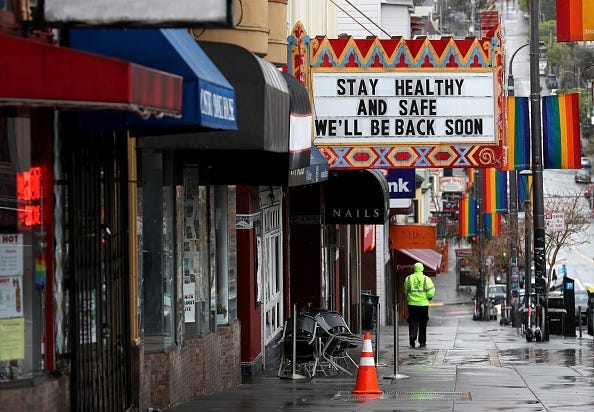Seven Bay Area counties announced a shelter-in-place order that took effect March 17 to slow the spread of the coronavirus. But the orders had some ambiguity and exemptions, leaving many wondering what is open and what is not.
What’s Open?
Essential businesses will remain open, and public utilities like garbage pick-up will remain operational.
Food/drink: - Grocery stores, restaurants and some coffee shops for takeout and delivery only, food banks.
- Delivery services that take food, goods or services directly to residents.
Medical:
- Pharmacies and hospitals, although some “non-essential” health appointments may be canceled. Check with your doctor.
- Visitations for those checked into the hospitals, nursing homes and residential care facilities are limited. Please contact the facility you would like to visit by phone before you go.
- San Francisco Mayor London Breed declared cannabis clubs as "essential," and that they are allowed to continue operation.
Cannabis is an needed medicine for many San Franciscans and dispensaries are allowed to continue operating. https://t.co/dydreGT7pF
— London Breed (@LondonBreed)
March 17, 2020 Public needs:
- Department of Motor Vehicles (DMV) and the United States Post Office are resuming normal operations.
Retail:
- Stores that sell products necessary for home sanitization and maintenance, such as Target and Walmart.
Other needs:
- Gas stations, auto repair shops, vehicle rental centers (i.e. Hertz), hardware stores, home-supply stores, home repair services, banks, laundry services and vet services remain open.
- Media outlets will maintain operation, with some employees working from home.
Care facilities:
- Some child-care facilities are still open, with children in groups of no larger than 12. Children at these facilities must stay in the same group every day.
- Residential care facilities for adults and seniors are to remain open, as well as non-profits that serve those in need.
- Businesses that do remain open are encouraged to follow the distancing guidelines of keeping 6 feet apart for both employees and customers, even for people standing in line. But there are currently no specific limitations on the amount of people allowed inside.
What’s Closed?
Everything else should be closed.
Criminal courts:- Federal courts in San Francisco, Oakland, and San Jose announced they’d be closed to the public until May 1, with no trials held before then.
- Contra Costa County Superior Court is closed from March 16 until at least April 1.
Retail and food:
- Major retailers like Macy’s, Sephora, Madewell, Lush Cosmetics, Patagonia, Urban Outfitters, Nike, Lululemon, and Apple are all closed until at least March 27.
- Philz Coffeeshops will be closed until further notice.
National Park Service:
- Point Reyes National Seashore has closed visitor centers and campgrounds until April 7, but its roads, trails and beaches are still open.
- Alcatraz Island is closed until April 7.
- Welcome centers at the Golden Gate Bridge, Presidio, Lands End, the Marin Headlands and Muir Woods are closed through April 7.
- Yosemite National Park is closing its visitor centers, theaters and museums through March 31, with additional locations working to do the same.
Gathering places:
- Gyms, bars, hair and nail salons, and other spaces considered “non-essential" have been ordered to close.
- Places considered as entertainment or leisure are closed, including museums, zoos, movie theaters, ski resorts and music venues.
- San Pablo Casino is closed until Wednesday, April 15. Pay and medical benefits are being provided for its 500 employees during the closure.
- All non-essential gatherings of any size are now banned. While it won’t be harshly enforced, officials are emphasizing that disobeying these orders puts the public at risk for possible coronavirus infection and counts as a misdemeanor crime.
Written by Mallory Somera, with reporting from Margie Shafer.


